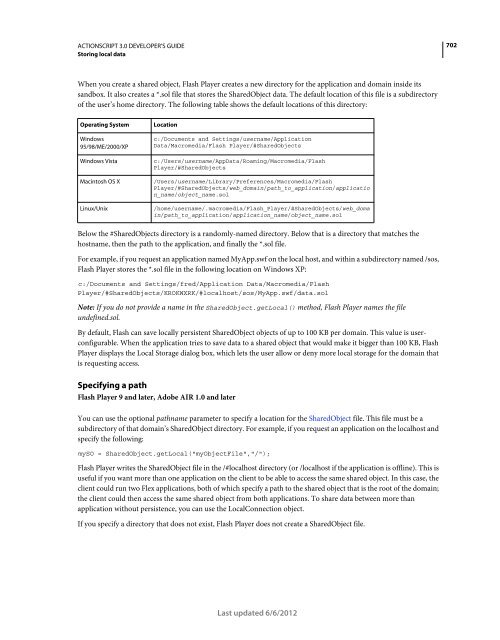- Page 1 and 2:
ACTIONSCRIPT ® 3.0 Developer’s G
- Page 3 and 4:
Contents Chapter 1: Working with da
- Page 5 and 6:
ACTIONSCRIPT 3.0 DEVELOPER’S GUID
- Page 7 and 8:
ACTIONSCRIPT 3.0 DEVELOPER’S GUID
- Page 9 and 10:
ACTIONSCRIPT 3.0 DEVELOPER’S GUID
- Page 11 and 12:
ACTIONSCRIPT 3.0 DEVELOPER’S GUID
- Page 13 and 14:
ACTIONSCRIPT 3.0 DEVELOPER’S GUID
- Page 15 and 16:
ACTIONSCRIPT 3.0 DEVELOPER’S GUID
- Page 17 and 18:
ACTIONSCRIPT 3.0 DEVELOPER’S GUID
- Page 19 and 20:
ACTIONSCRIPT 3.0 DEVELOPER’S GUID
- Page 21 and 22:
ACTIONSCRIPT 3.0 DEVELOPER’S GUID
- Page 23 and 24:
Chapter 2: Working with strings Fla
- Page 25 and 26:
ACTIONSCRIPT 3.0 DEVELOPER’S GUID
- Page 27 and 28:
ACTIONSCRIPT 3.0 DEVELOPER’S GUID
- Page 29 and 30:
ACTIONSCRIPT 3.0 DEVELOPER’S GUID
- Page 31 and 32:
ACTIONSCRIPT 3.0 DEVELOPER’S GUID
- Page 33 and 34:
ACTIONSCRIPT 3.0 DEVELOPER’S GUID
- Page 35 and 36:
ACTIONSCRIPT 3.0 DEVELOPER’S GUID
- Page 37 and 38:
ACTIONSCRIPT 3.0 DEVELOPER’S GUID
- Page 39 and 40:
ACTIONSCRIPT 3.0 DEVELOPER’S GUID
- Page 41 and 42:
ACTIONSCRIPT 3.0 DEVELOPER’S GUID
- Page 43 and 44:
ACTIONSCRIPT 3.0 DEVELOPER’S GUID
- Page 45 and 46:
ACTIONSCRIPT 3.0 DEVELOPER’S GUID
- Page 47 and 48:
ACTIONSCRIPT 3.0 DEVELOPER’S GUID
- Page 49 and 50:
ACTIONSCRIPT 3.0 DEVELOPER’S GUID
- Page 51 and 52:
ACTIONSCRIPT 3.0 DEVELOPER’S GUID
- Page 53 and 54:
ACTIONSCRIPT 3.0 DEVELOPER’S GUID
- Page 55 and 56:
ACTIONSCRIPT 3.0 DEVELOPER’S GUID
- Page 57 and 58:
ACTIONSCRIPT 3.0 DEVELOPER’S GUID
- Page 59 and 60:
ACTIONSCRIPT 3.0 DEVELOPER’S GUID
- Page 61 and 62:
ACTIONSCRIPT 3.0 DEVELOPER’S GUID
- Page 63 and 64:
ACTIONSCRIPT 3.0 DEVELOPER’S GUID
- Page 65 and 66:
Chapter 4: Handling errors Flash Pl
- Page 67 and 68:
ACTIONSCRIPT 3.0 DEVELOPER’S GUID
- Page 69 and 70:
ACTIONSCRIPT 3.0 DEVELOPER’S GUID
- Page 71 and 72:
ACTIONSCRIPT 3.0 DEVELOPER’S GUID
- Page 73 and 74:
ACTIONSCRIPT 3.0 DEVELOPER’S GUID
- Page 75 and 76:
ACTIONSCRIPT 3.0 DEVELOPER’S GUID
- Page 77 and 78:
ACTIONSCRIPT 3.0 DEVELOPER’S GUID
- Page 79 and 80:
ACTIONSCRIPT 3.0 DEVELOPER’S GUID
- Page 81 and 82:
ACTIONSCRIPT 3.0 DEVELOPER’S GUID
- Page 83 and 84:
ACTIONSCRIPT 3.0 DEVELOPER’S GUID
- Page 85 and 86:
ACTIONSCRIPT 3.0 DEVELOPER’S GUID
- Page 87 and 88:
ACTIONSCRIPT 3.0 DEVELOPER’S GUID
- Page 89 and 90:
Chapter 5: Using regular expression
- Page 91 and 92:
ACTIONSCRIPT 3.0 DEVELOPER’S GUID
- Page 93 and 94:
ACTIONSCRIPT 3.0 DEVELOPER’S GUID
- Page 95 and 96:
ACTIONSCRIPT 3.0 DEVELOPER’S GUID
- Page 97 and 98:
ACTIONSCRIPT 3.0 DEVELOPER’S GUID
- Page 99 and 100:
ACTIONSCRIPT 3.0 DEVELOPER’S GUID
- Page 101 and 102:
ACTIONSCRIPT 3.0 DEVELOPER’S GUID
- Page 103 and 104:
ACTIONSCRIPT 3.0 DEVELOPER’S GUID
- Page 105 and 106:
ACTIONSCRIPT 3.0 DEVELOPER’S GUID
- Page 107 and 108:
ACTIONSCRIPT 3.0 DEVELOPER’S GUID
- Page 109 and 110:
ACTIONSCRIPT 3.0 DEVELOPER’S GUID
- Page 111 and 112:
ACTIONSCRIPT 3.0 DEVELOPER’S GUID
- Page 113 and 114:
ACTIONSCRIPT 3.0 DEVELOPER’S GUID
- Page 115 and 116:
ACTIONSCRIPT 3.0 DEVELOPER’S GUID
- Page 117 and 118:
ACTIONSCRIPT 3.0 DEVELOPER’S GUID
- Page 119 and 120:
ACTIONSCRIPT 3.0 DEVELOPER’S GUID
- Page 121 and 122:
ACTIONSCRIPT 3.0 DEVELOPER’S GUID
- Page 123 and 124:
ACTIONSCRIPT 3.0 DEVELOPER’S GUID
- Page 125 and 126:
ACTIONSCRIPT 3.0 DEVELOPER’S GUID
- Page 127 and 128:
ACTIONSCRIPT 3.0 DEVELOPER’S GUID
- Page 129 and 130:
ACTIONSCRIPT 3.0 DEVELOPER’S GUID
- Page 131 and 132:
ACTIONSCRIPT 3.0 DEVELOPER’S GUID
- Page 133 and 134:
ACTIONSCRIPT 3.0 DEVELOPER’S GUID
- Page 135 and 136:
ACTIONSCRIPT 3.0 DEVELOPER’S GUID
- Page 137 and 138:
ACTIONSCRIPT 3.0 DEVELOPER’S GUID
- Page 139 and 140:
ACTIONSCRIPT 3.0 DEVELOPER’S GUID
- Page 141 and 142:
ACTIONSCRIPT 3.0 DEVELOPER’S GUID
- Page 143 and 144:
ACTIONSCRIPT 3.0 DEVELOPER’S GUID
- Page 145 and 146:
ACTIONSCRIPT 3.0 DEVELOPER’S GUID
- Page 147 and 148:
ACTIONSCRIPT 3.0 DEVELOPER’S GUID
- Page 149 and 150:
ACTIONSCRIPT 3.0 DEVELOPER’S GUID
- Page 151 and 152:
ACTIONSCRIPT 3.0 DEVELOPER’S GUID
- Page 153 and 154:
ACTIONSCRIPT 3.0 DEVELOPER’S GUID
- Page 155 and 156:
ACTIONSCRIPT 3.0 DEVELOPER’S GUID
- Page 157 and 158:
ACTIONSCRIPT 3.0 DEVELOPER’S GUID
- Page 159 and 160:
ACTIONSCRIPT 3.0 DEVELOPER’S GUID
- Page 161 and 162:
ACTIONSCRIPT 3.0 DEVELOPER’S GUID
- Page 163 and 164:
ACTIONSCRIPT 3.0 DEVELOPER’S GUID
- Page 165 and 166:
ACTIONSCRIPT 3.0 DEVELOPER’S GUID
- Page 167 and 168:
ACTIONSCRIPT 3.0 DEVELOPER’S GUID
- Page 169 and 170:
ACTIONSCRIPT 3.0 DEVELOPER’S GUID
- Page 171 and 172:
ACTIONSCRIPT 3.0 DEVELOPER’S GUID
- Page 173 and 174:
ACTIONSCRIPT 3.0 DEVELOPER’S GUID
- Page 175 and 176:
ACTIONSCRIPT 3.0 DEVELOPER’S GUID
- Page 177 and 178:
ACTIONSCRIPT 3.0 DEVELOPER’S GUID
- Page 179 and 180:
ACTIONSCRIPT 3.0 DEVELOPER’S GUID
- Page 181 and 182:
ACTIONSCRIPT 3.0 DEVELOPER’S GUID
- Page 183 and 184:
ACTIONSCRIPT 3.0 DEVELOPER’S GUID
- Page 185 and 186:
ACTIONSCRIPT 3.0 DEVELOPER’S GUID
- Page 187 and 188:
ACTIONSCRIPT 3.0 DEVELOPER’S GUID
- Page 189 and 190:
ACTIONSCRIPT 3.0 DEVELOPER’S GUID
- Page 191 and 192:
ACTIONSCRIPT 3.0 DEVELOPER’S GUID
- Page 193 and 194:
ACTIONSCRIPT 3.0 DEVELOPER’S GUID
- Page 195 and 196:
ACTIONSCRIPT 3.0 DEVELOPER’S GUID
- Page 197 and 198:
ACTIONSCRIPT 3.0 DEVELOPER’S GUID
- Page 199 and 200:
ACTIONSCRIPT 3.0 DEVELOPER’S GUID
- Page 201 and 202:
ACTIONSCRIPT 3.0 DEVELOPER’S GUID
- Page 203 and 204:
ACTIONSCRIPT 3.0 DEVELOPER’S GUID
- Page 205 and 206:
ACTIONSCRIPT 3.0 DEVELOPER’S GUID
- Page 207 and 208:
ACTIONSCRIPT 3.0 DEVELOPER’S GUID
- Page 209 and 210:
ACTIONSCRIPT 3.0 DEVELOPER’S GUID
- Page 211 and 212:
ACTIONSCRIPT 3.0 DEVELOPER’S GUID
- Page 213 and 214:
ACTIONSCRIPT 3.0 DEVELOPER’S GUID
- Page 215 and 216:
ACTIONSCRIPT 3.0 DEVELOPER’S GUID
- Page 217 and 218:
ACTIONSCRIPT 3.0 DEVELOPER’S GUID
- Page 219 and 220:
ACTIONSCRIPT 3.0 DEVELOPER’S GUID
- Page 221 and 222:
ACTIONSCRIPT 3.0 DEVELOPER’S GUID
- Page 223 and 224:
ACTIONSCRIPT 3.0 DEVELOPER’S GUID
- Page 225 and 226:
ACTIONSCRIPT 3.0 DEVELOPER’S GUID
- Page 227 and 228:
ACTIONSCRIPT 3.0 DEVELOPER’S GUID
- Page 229 and 230:
ACTIONSCRIPT 3.0 DEVELOPER’S GUID
- Page 231 and 232:
ACTIONSCRIPT 3.0 DEVELOPER’S GUID
- Page 233 and 234:
ACTIONSCRIPT 3.0 DEVELOPER’S GUID
- Page 235 and 236:
ACTIONSCRIPT 3.0 DEVELOPER’S GUID
- Page 237 and 238:
ACTIONSCRIPT 3.0 DEVELOPER’S GUID
- Page 239 and 240:
ACTIONSCRIPT 3.0 DEVELOPER’S GUID
- Page 241 and 242:
ACTIONSCRIPT 3.0 DEVELOPER’S GUID
- Page 243 and 244:
ACTIONSCRIPT 3.0 DEVELOPER’S GUID
- Page 245 and 246:
ACTIONSCRIPT 3.0 DEVELOPER’S GUID
- Page 247 and 248:
ACTIONSCRIPT 3.0 DEVELOPER’S GUID
- Page 249 and 250:
ACTIONSCRIPT 3.0 DEVELOPER’S GUID
- Page 251 and 252:
ACTIONSCRIPT 3.0 DEVELOPER’S GUID
- Page 253 and 254:
ACTIONSCRIPT 3.0 DEVELOPER’S GUID
- Page 255 and 256:
Chapter 13: Working with bitmaps Fl
- Page 257 and 258:
ACTIONSCRIPT 3.0 DEVELOPER’S GUID
- Page 259 and 260:
ACTIONSCRIPT 3.0 DEVELOPER’S GUID
- Page 261 and 262:
ACTIONSCRIPT 3.0 DEVELOPER’S GUID
- Page 263 and 264:
ACTIONSCRIPT 3.0 DEVELOPER’S GUID
- Page 265 and 266:
ACTIONSCRIPT 3.0 DEVELOPER’S GUID
- Page 267 and 268:
ACTIONSCRIPT 3.0 DEVELOPER’S GUID
- Page 269 and 270:
ACTIONSCRIPT 3.0 DEVELOPER’S GUID
- Page 271 and 272:
ACTIONSCRIPT 3.0 DEVELOPER’S GUID
- Page 273 and 274:
ACTIONSCRIPT 3.0 DEVELOPER’S GUID
- Page 275 and 276:
ACTIONSCRIPT 3.0 DEVELOPER’S GUID
- Page 277 and 278:
ACTIONSCRIPT 3.0 DEVELOPER’S GUID
- Page 279 and 280:
ACTIONSCRIPT 3.0 DEVELOPER’S GUID
- Page 281 and 282:
ACTIONSCRIPT 3.0 DEVELOPER’S GUID
- Page 283 and 284:
ACTIONSCRIPT 3.0 DEVELOPER’S GUID
- Page 285 and 286:
ACTIONSCRIPT 3.0 DEVELOPER’S GUID
- Page 287 and 288:
ACTIONSCRIPT 3.0 DEVELOPER’S GUID
- Page 289 and 290:
ACTIONSCRIPT 3.0 DEVELOPER’S GUID
- Page 291 and 292:
ACTIONSCRIPT 3.0 DEVELOPER’S GUID
- Page 293 and 294:
ACTIONSCRIPT 3.0 DEVELOPER’S GUID
- Page 295 and 296:
ACTIONSCRIPT 3.0 DEVELOPER’S GUID
- Page 297 and 298:
ACTIONSCRIPT 3.0 DEVELOPER’S GUID
- Page 299 and 300:
ACTIONSCRIPT 3.0 DEVELOPER’S GUID
- Page 301 and 302:
ACTIONSCRIPT 3.0 DEVELOPER’S GUID
- Page 303 and 304:
ACTIONSCRIPT 3.0 DEVELOPER’S GUID
- Page 305 and 306:
ACTIONSCRIPT 3.0 DEVELOPER’S GUID
- Page 307 and 308:
ACTIONSCRIPT 3.0 DEVELOPER’S GUID
- Page 309 and 310:
ACTIONSCRIPT 3.0 DEVELOPER’S GUID
- Page 311 and 312:
ACTIONSCRIPT 3.0 DEVELOPER’S GUID
- Page 313 and 314:
Chapter 15: Working with Pixel Bend
- Page 315 and 316:
ACTIONSCRIPT 3.0 DEVELOPER’S GUID
- Page 317 and 318:
ACTIONSCRIPT 3.0 DEVELOPER’S GUID
- Page 319 and 320:
ACTIONSCRIPT 3.0 DEVELOPER’S GUID
- Page 321 and 322:
ACTIONSCRIPT 3.0 DEVELOPER’S GUID
- Page 323 and 324:
ACTIONSCRIPT 3.0 DEVELOPER’S GUID
- Page 325 and 326:
ACTIONSCRIPT 3.0 DEVELOPER’S GUID
- Page 327 and 328:
ACTIONSCRIPT 3.0 DEVELOPER’S GUID
- Page 329 and 330:
ACTIONSCRIPT 3.0 DEVELOPER’S GUID
- Page 331 and 332:
ACTIONSCRIPT 3.0 DEVELOPER’S GUID
- Page 333 and 334:
ACTIONSCRIPT 3.0 DEVELOPER’S GUID
- Page 335 and 336:
Chapter 16: Working with movie clip
- Page 337 and 338:
ACTIONSCRIPT 3.0 DEVELOPER’S GUID
- Page 339 and 340:
ACTIONSCRIPT 3.0 DEVELOPER’S GUID
- Page 341 and 342:
ACTIONSCRIPT 3.0 DEVELOPER’S GUID
- Page 343 and 344:
ACTIONSCRIPT 3.0 DEVELOPER’S GUID
- Page 345 and 346:
ACTIONSCRIPT 3.0 DEVELOPER’S GUID
- Page 347 and 348:
ACTIONSCRIPT 3.0 DEVELOPER’S GUID
- Page 349 and 350:
ACTIONSCRIPT 3.0 DEVELOPER’S GUID
- Page 351 and 352:
ACTIONSCRIPT 3.0 DEVELOPER’S GUID
- Page 353 and 354:
ACTIONSCRIPT 3.0 DEVELOPER’S GUID
- Page 355 and 356:
ACTIONSCRIPT 3.0 DEVELOPER’S GUID
- Page 357 and 358:
ACTIONSCRIPT 3.0 DEVELOPER’S GUID
- Page 359 and 360:
ACTIONSCRIPT 3.0 DEVELOPER’S GUID
- Page 361 and 362:
ACTIONSCRIPT 3.0 DEVELOPER’S GUID
- Page 363 and 364:
Chapter 19: Working in three dimens
- Page 365 and 366:
ACTIONSCRIPT 3.0 DEVELOPER’S GUID
- Page 367 and 368:
ACTIONSCRIPT 3.0 DEVELOPER’S GUID
- Page 369 and 370:
ACTIONSCRIPT 3.0 DEVELOPER’S GUID
- Page 371 and 372:
ACTIONSCRIPT 3.0 DEVELOPER’S GUID
- Page 373 and 374:
ACTIONSCRIPT 3.0 DEVELOPER’S GUID
- Page 375 and 376:
ACTIONSCRIPT 3.0 DEVELOPER’S GUID
- Page 377 and 378:
ACTIONSCRIPT 3.0 DEVELOPER’S GUID
- Page 379 and 380:
ACTIONSCRIPT 3.0 DEVELOPER’S GUID
- Page 381 and 382:
ACTIONSCRIPT 3.0 DEVELOPER’S GUID
- Page 383 and 384:
ACTIONSCRIPT 3.0 DEVELOPER’S GUID
- Page 385 and 386:
ACTIONSCRIPT 3.0 DEVELOPER’S GUID
- Page 387 and 388:
ACTIONSCRIPT 3.0 DEVELOPER’S GUID
- Page 389 and 390:
ACTIONSCRIPT 3.0 DEVELOPER’S GUID
- Page 391 and 392:
ACTIONSCRIPT 3.0 DEVELOPER’S GUID
- Page 393 and 394:
ACTIONSCRIPT 3.0 DEVELOPER’S GUID
- Page 395 and 396:
ACTIONSCRIPT 3.0 DEVELOPER’S GUID
- Page 397 and 398:
ACTIONSCRIPT 3.0 DEVELOPER’S GUID
- Page 399 and 400:
ACTIONSCRIPT 3.0 DEVELOPER’S GUID
- Page 401 and 402:
ACTIONSCRIPT 3.0 DEVELOPER’S GUID
- Page 403 and 404:
ACTIONSCRIPT 3.0 DEVELOPER’S GUID
- Page 405 and 406:
ACTIONSCRIPT 3.0 DEVELOPER’S GUID
- Page 407 and 408:
ACTIONSCRIPT 3.0 DEVELOPER’S GUID
- Page 409 and 410:
ACTIONSCRIPT 3.0 DEVELOPER’S GUID
- Page 411 and 412:
ACTIONSCRIPT 3.0 DEVELOPER’S GUID
- Page 413 and 414:
ACTIONSCRIPT 3.0 DEVELOPER’S GUID
- Page 415 and 416:
ACTIONSCRIPT 3.0 DEVELOPER’S GUID
- Page 417 and 418:
ACTIONSCRIPT 3.0 DEVELOPER’S GUID
- Page 419 and 420:
ACTIONSCRIPT 3.0 DEVELOPER’S GUID
- Page 421 and 422:
ACTIONSCRIPT 3.0 DEVELOPER’S GUID
- Page 423 and 424:
ACTIONSCRIPT 3.0 DEVELOPER’S GUID
- Page 425 and 426:
ACTIONSCRIPT 3.0 DEVELOPER’S GUID
- Page 427 and 428:
ACTIONSCRIPT 3.0 DEVELOPER’S GUID
- Page 429 and 430:
ACTIONSCRIPT 3.0 DEVELOPER’S GUID
- Page 431 and 432:
ACTIONSCRIPT 3.0 DEVELOPER’S GUID
- Page 433 and 434:
ACTIONSCRIPT 3.0 DEVELOPER’S GUID
- Page 435 and 436:
ACTIONSCRIPT 3.0 DEVELOPER’S GUID
- Page 437 and 438:
ACTIONSCRIPT 3.0 DEVELOPER’S GUID
- Page 439 and 440:
Chapter 23: Using the Text Layout F
- Page 441 and 442:
ACTIONSCRIPT 3.0 DEVELOPER’S GUID
- Page 443 and 444:
ACTIONSCRIPT 3.0 DEVELOPER’S GUID
- Page 445 and 446:
ACTIONSCRIPT 3.0 DEVELOPER’S GUID
- Page 447 and 448:
ACTIONSCRIPT 3.0 DEVELOPER’S GUID
- Page 449 and 450:
ACTIONSCRIPT 3.0 DEVELOPER’S GUID
- Page 451 and 452:
ACTIONSCRIPT 3.0 DEVELOPER’S GUID
- Page 453 and 454:
ACTIONSCRIPT 3.0 DEVELOPER’S GUID
- Page 455 and 456:
ACTIONSCRIPT 3.0 DEVELOPER’S GUID
- Page 457 and 458:
ACTIONSCRIPT 3.0 DEVELOPER’S GUID
- Page 459 and 460:
ACTIONSCRIPT 3.0 DEVELOPER’S GUID
- Page 461 and 462:
ACTIONSCRIPT 3.0 DEVELOPER’S GUID
- Page 463 and 464:
ACTIONSCRIPT 3.0 DEVELOPER’S GUID
- Page 465 and 466:
ACTIONSCRIPT 3.0 DEVELOPER’S GUID
- Page 467 and 468:
ACTIONSCRIPT 3.0 DEVELOPER’S GUID
- Page 469 and 470:
ACTIONSCRIPT 3.0 DEVELOPER’S GUID
- Page 471 and 472:
ACTIONSCRIPT 3.0 DEVELOPER’S GUID
- Page 473 and 474:
ACTIONSCRIPT 3.0 DEVELOPER’S GUID
- Page 475 and 476:
ACTIONSCRIPT 3.0 DEVELOPER’S GUID
- Page 477 and 478:
ACTIONSCRIPT 3.0 DEVELOPER’S GUID
- Page 479 and 480:
ACTIONSCRIPT 3.0 DEVELOPER’S GUID
- Page 481 and 482:
ACTIONSCRIPT 3.0 DEVELOPER’S GUID
- Page 483 and 484:
ACTIONSCRIPT 3.0 DEVELOPER’S GUID
- Page 485 and 486:
ACTIONSCRIPT 3.0 DEVELOPER’S GUID
- Page 487 and 488:
Chapter 25: Working with video Flas
- Page 489 and 490:
ACTIONSCRIPT 3.0 DEVELOPER’S GUID
- Page 491 and 492:
ACTIONSCRIPT 3.0 DEVELOPER’S GUID
- Page 493 and 494:
ACTIONSCRIPT 3.0 DEVELOPER’S GUID
- Page 495 and 496:
ACTIONSCRIPT 3.0 DEVELOPER’S GUID
- Page 497 and 498:
ACTIONSCRIPT 3.0 DEVELOPER’S GUID
- Page 499 and 500:
ACTIONSCRIPT 3.0 DEVELOPER’S GUID
- Page 501 and 502:
ACTIONSCRIPT 3.0 DEVELOPER’S GUID
- Page 503 and 504:
ACTIONSCRIPT 3.0 DEVELOPER’S GUID
- Page 505 and 506:
ACTIONSCRIPT 3.0 DEVELOPER’S GUID
- Page 507 and 508:
ACTIONSCRIPT 3.0 DEVELOPER’S GUID
- Page 509 and 510:
ACTIONSCRIPT 3.0 DEVELOPER’S GUID
- Page 511 and 512:
ACTIONSCRIPT 3.0 DEVELOPER’S GUID
- Page 513 and 514:
ACTIONSCRIPT 3.0 DEVELOPER’S GUID
- Page 515 and 516:
ACTIONSCRIPT 3.0 DEVELOPER’S GUID
- Page 517 and 518:
ACTIONSCRIPT 3.0 DEVELOPER’S GUID
- Page 519 and 520:
ACTIONSCRIPT 3.0 DEVELOPER’S GUID
- Page 521 and 522:
ACTIONSCRIPT 3.0 DEVELOPER’S GUID
- Page 523 and 524:
ACTIONSCRIPT 3.0 DEVELOPER’S GUID
- Page 525 and 526:
ACTIONSCRIPT 3.0 DEVELOPER’S GUID
- Page 527 and 528:
ACTIONSCRIPT 3.0 DEVELOPER’S GUID
- Page 529 and 530:
ACTIONSCRIPT 3.0 DEVELOPER’S GUID
- Page 531 and 532:
ACTIONSCRIPT 3.0 DEVELOPER’S GUID
- Page 533 and 534:
Chapter 26: Working with cameras Fl
- Page 535 and 536:
ACTIONSCRIPT 3.0 DEVELOPER’S GUID
- Page 537 and 538:
ACTIONSCRIPT 3.0 DEVELOPER’S GUID
- Page 539 and 540:
ACTIONSCRIPT 3.0 DEVELOPER’S GUID
- Page 541 and 542:
ACTIONSCRIPT 3.0 DEVELOPER’S GUID
- Page 543 and 544:
ACTIONSCRIPT 3.0 DEVELOPER’S GUID
- Page 545 and 546:
ACTIONSCRIPT 3.0 DEVELOPER’S GUID
- Page 547 and 548:
ACTIONSCRIPT 3.0 DEVELOPER’S GUID
- Page 549 and 550:
ACTIONSCRIPT 3.0 DEVELOPER’S GUID
- Page 551 and 552:
ACTIONSCRIPT 3.0 DEVELOPER’S GUID
- Page 553 and 554:
ACTIONSCRIPT 3.0 DEVELOPER’S GUID
- Page 555 and 556:
ACTIONSCRIPT 3.0 DEVELOPER’S GUID
- Page 557 and 558:
ACTIONSCRIPT 3.0 DEVELOPER’S GUID
- Page 559 and 560:
ACTIONSCRIPT 3.0 DEVELOPER’S GUID
- Page 561 and 562:
ACTIONSCRIPT 3.0 DEVELOPER’S GUID
- Page 563 and 564:
Chapter 28: Adding PDF content in A
- Page 565 and 566:
ACTIONSCRIPT 3.0 DEVELOPER’S GUID
- Page 567 and 568:
ACTIONSCRIPT 3.0 DEVELOPER’S GUID
- Page 569 and 570:
ACTIONSCRIPT 3.0 DEVELOPER’S GUID
- Page 571 and 572:
ACTIONSCRIPT 3.0 DEVELOPER’S GUID
- Page 573 and 574:
ACTIONSCRIPT 3.0 DEVELOPER’S GUID
- Page 575 and 576:
ACTIONSCRIPT 3.0 DEVELOPER’S GUID
- Page 577 and 578:
ACTIONSCRIPT 3.0 DEVELOPER’S GUID
- Page 579 and 580:
ACTIONSCRIPT 3.0 DEVELOPER’S GUID
- Page 581 and 582:
ACTIONSCRIPT 3.0 DEVELOPER’S GUID
- Page 583 and 584:
ACTIONSCRIPT 3.0 DEVELOPER’S GUID
- Page 585 and 586:
ACTIONSCRIPT 3.0 DEVELOPER’S GUID
- Page 587 and 588:
Chapter 31: Mouse input Flash Playe
- Page 589 and 590:
ACTIONSCRIPT 3.0 DEVELOPER’S GUID
- Page 591 and 592:
ACTIONSCRIPT 3.0 DEVELOPER’S GUID
- Page 593 and 594:
Chapter 32: Touch, multitouch and g
- Page 595 and 596:
ACTIONSCRIPT 3.0 DEVELOPER’S GUID
- Page 597 and 598:
ACTIONSCRIPT 3.0 DEVELOPER’S GUID
- Page 599 and 600:
ACTIONSCRIPT 3.0 DEVELOPER’S GUID
- Page 601 and 602:
ACTIONSCRIPT 3.0 DEVELOPER’S GUID
- Page 603 and 604:
ACTIONSCRIPT 3.0 DEVELOPER’S GUID
- Page 605 and 606:
ACTIONSCRIPT 3.0 DEVELOPER’S GUID
- Page 607 and 608:
ACTIONSCRIPT 3.0 DEVELOPER’S GUID
- Page 609 and 610:
ACTIONSCRIPT 3.0 DEVELOPER’S GUID
- Page 611 and 612:
ACTIONSCRIPT 3.0 DEVELOPER’S GUID
- Page 613 and 614:
ACTIONSCRIPT 3.0 DEVELOPER’S GUID
- Page 615 and 616:
ACTIONSCRIPT 3.0 DEVELOPER’S GUID
- Page 617 and 618:
Chapter 34: Accelerometer input Fla
- Page 619 and 620:
ACTIONSCRIPT 3.0 DEVELOPER’S GUID
- Page 621 and 622:
ACTIONSCRIPT 3.0 DEVELOPER’S GUID
- Page 623 and 624:
ACTIONSCRIPT 3.0 DEVELOPER’S GUID
- Page 625 and 626:
ACTIONSCRIPT 3.0 DEVELOPER’S GUID
- Page 627 and 628:
ACTIONSCRIPT 3.0 DEVELOPER’S GUID
- Page 629 and 630:
ACTIONSCRIPT 3.0 DEVELOPER’S GUID
- Page 631 and 632:
ACTIONSCRIPT 3.0 DEVELOPER’S GUID
- Page 633 and 634:
ACTIONSCRIPT 3.0 DEVELOPER’S GUID
- Page 635 and 636:
ACTIONSCRIPT 3.0 DEVELOPER’S GUID
- Page 637 and 638:
ACTIONSCRIPT 3.0 DEVELOPER’S GUID
- Page 639 and 640:
ACTIONSCRIPT 3.0 DEVELOPER’S GUID
- Page 641 and 642:
ACTIONSCRIPT 3.0 DEVELOPER’S GUID
- Page 643 and 644:
ACTIONSCRIPT 3.0 DEVELOPER’S GUID
- Page 645 and 646:
ACTIONSCRIPT 3.0 DEVELOPER’S GUID
- Page 647 and 648:
ACTIONSCRIPT 3.0 DEVELOPER’S GUID
- Page 649 and 650:
ACTIONSCRIPT 3.0 DEVELOPER’S GUID
- Page 651 and 652:
ACTIONSCRIPT 3.0 DEVELOPER’S GUID
- Page 653 and 654:
ACTIONSCRIPT 3.0 DEVELOPER’S GUID
- Page 655 and 656:
ACTIONSCRIPT 3.0 DEVELOPER’S GUID
- Page 657 and 658:
ACTIONSCRIPT 3.0 DEVELOPER’S GUID
- Page 659 and 660:
ACTIONSCRIPT 3.0 DEVELOPER’S GUID
- Page 661 and 662:
ACTIONSCRIPT 3.0 DEVELOPER’S GUID
- Page 663 and 664: ACTIONSCRIPT 3.0 DEVELOPER’S GUID
- Page 665 and 666: Chapter 38: Working with the file s
- Page 667 and 668: ACTIONSCRIPT 3.0 DEVELOPER’S GUID
- Page 669 and 670: ACTIONSCRIPT 3.0 DEVELOPER’S GUID
- Page 671 and 672: ACTIONSCRIPT 3.0 DEVELOPER’S GUID
- Page 673 and 674: ACTIONSCRIPT 3.0 DEVELOPER’S GUID
- Page 675 and 676: ACTIONSCRIPT 3.0 DEVELOPER’S GUID
- Page 677 and 678: ACTIONSCRIPT 3.0 DEVELOPER’S GUID
- Page 679 and 680: ACTIONSCRIPT 3.0 DEVELOPER’S GUID
- Page 681 and 682: ACTIONSCRIPT 3.0 DEVELOPER’S GUID
- Page 683 and 684: ACTIONSCRIPT 3.0 DEVELOPER’S GUID
- Page 685 and 686: ACTIONSCRIPT 3.0 DEVELOPER’S GUID
- Page 687 and 688: ACTIONSCRIPT 3.0 DEVELOPER’S GUID
- Page 689 and 690: ACTIONSCRIPT 3.0 DEVELOPER’S GUID
- Page 691 and 692: ACTIONSCRIPT 3.0 DEVELOPER’S GUID
- Page 693 and 694: ACTIONSCRIPT 3.0 DEVELOPER’S GUID
- Page 695 and 696: ACTIONSCRIPT 3.0 DEVELOPER’S GUID
- Page 697 and 698: ACTIONSCRIPT 3.0 DEVELOPER’S GUID
- Page 699 and 700: ACTIONSCRIPT 3.0 DEVELOPER’S GUID
- Page 701 and 702: ACTIONSCRIPT 3.0 DEVELOPER’S GUID
- Page 703 and 704: ACTIONSCRIPT 3.0 DEVELOPER’S GUID
- Page 705 and 706: ACTIONSCRIPT 3.0 DEVELOPER’S GUID
- Page 707 and 708: ACTIONSCRIPT 3.0 DEVELOPER’S GUID
- Page 709 and 710: ACTIONSCRIPT 3.0 DEVELOPER’S GUID
- Page 711 and 712: ACTIONSCRIPT 3.0 DEVELOPER’S GUID
- Page 713: Chapter 39: Storing local data Flas
- Page 717 and 718: ACTIONSCRIPT 3.0 DEVELOPER’S GUID
- Page 719 and 720: ACTIONSCRIPT 3.0 DEVELOPER’S GUID
- Page 721 and 722: ACTIONSCRIPT 3.0 DEVELOPER’S GUID
- Page 723 and 724: ACTIONSCRIPT 3.0 DEVELOPER’S GUID
- Page 725 and 726: ACTIONSCRIPT 3.0 DEVELOPER’S GUID
- Page 727 and 728: ACTIONSCRIPT 3.0 DEVELOPER’S GUID
- Page 729 and 730: ACTIONSCRIPT 3.0 DEVELOPER’S GUID
- Page 731 and 732: ACTIONSCRIPT 3.0 DEVELOPER’S GUID
- Page 733 and 734: ACTIONSCRIPT 3.0 DEVELOPER’S GUID
- Page 735 and 736: ACTIONSCRIPT 3.0 DEVELOPER’S GUID
- Page 737 and 738: ACTIONSCRIPT 3.0 DEVELOPER’S GUID
- Page 739 and 740: ACTIONSCRIPT 3.0 DEVELOPER’S GUID
- Page 741 and 742: ACTIONSCRIPT 3.0 DEVELOPER’S GUID
- Page 743 and 744: ACTIONSCRIPT 3.0 DEVELOPER’S GUID
- Page 745 and 746: ACTIONSCRIPT 3.0 DEVELOPER’S GUID
- Page 747 and 748: ACTIONSCRIPT 3.0 DEVELOPER’S GUID
- Page 749 and 750: ACTIONSCRIPT 3.0 DEVELOPER’S GUID
- Page 751 and 752: ACTIONSCRIPT 3.0 DEVELOPER’S GUID
- Page 753 and 754: ACTIONSCRIPT 3.0 DEVELOPER’S GUID
- Page 755 and 756: ACTIONSCRIPT 3.0 DEVELOPER’S GUID
- Page 757 and 758: ACTIONSCRIPT 3.0 DEVELOPER’S GUID
- Page 759 and 760: ACTIONSCRIPT 3.0 DEVELOPER’S GUID
- Page 761 and 762: ACTIONSCRIPT 3.0 DEVELOPER’S GUID
- Page 763 and 764: ACTIONSCRIPT 3.0 DEVELOPER’S GUID
- Page 765 and 766:
ACTIONSCRIPT 3.0 DEVELOPER’S GUID
- Page 767 and 768:
ACTIONSCRIPT 3.0 DEVELOPER’S GUID
- Page 769 and 770:
ACTIONSCRIPT 3.0 DEVELOPER’S GUID
- Page 771 and 772:
ACTIONSCRIPT 3.0 DEVELOPER’S GUID
- Page 773 and 774:
ACTIONSCRIPT 3.0 DEVELOPER’S GUID
- Page 775 and 776:
ACTIONSCRIPT 3.0 DEVELOPER’S GUID
- Page 777 and 778:
ACTIONSCRIPT 3.0 DEVELOPER’S GUID
- Page 779 and 780:
ACTIONSCRIPT 3.0 DEVELOPER’S GUID
- Page 781 and 782:
ACTIONSCRIPT 3.0 DEVELOPER’S GUID
- Page 783 and 784:
ACTIONSCRIPT 3.0 DEVELOPER’S GUID
- Page 785 and 786:
ACTIONSCRIPT 3.0 DEVELOPER’S GUID
- Page 787 and 788:
ACTIONSCRIPT 3.0 DEVELOPER’S GUID
- Page 789 and 790:
ACTIONSCRIPT 3.0 DEVELOPER’S GUID
- Page 791 and 792:
ACTIONSCRIPT 3.0 DEVELOPER’S GUID
- Page 793 and 794:
ACTIONSCRIPT 3.0 DEVELOPER’S GUID
- Page 795 and 796:
ACTIONSCRIPT 3.0 DEVELOPER’S GUID
- Page 797 and 798:
ACTIONSCRIPT 3.0 DEVELOPER’S GUID
- Page 799 and 800:
ACTIONSCRIPT 3.0 DEVELOPER’S GUID
- Page 801 and 802:
Chapter 42: Basics of networking an
- Page 803 and 804:
ACTIONSCRIPT 3.0 DEVELOPER’S GUID
- Page 805 and 806:
ACTIONSCRIPT 3.0 DEVELOPER’S GUID
- Page 807 and 808:
ACTIONSCRIPT 3.0 DEVELOPER’S GUID
- Page 809 and 810:
Chapter 43: Sockets Flash Player 9
- Page 811 and 812:
ACTIONSCRIPT 3.0 DEVELOPER’S GUID
- Page 813 and 814:
ACTIONSCRIPT 3.0 DEVELOPER’S GUID
- Page 815 and 816:
ACTIONSCRIPT 3.0 DEVELOPER’S GUID
- Page 817 and 818:
ACTIONSCRIPT 3.0 DEVELOPER’S GUID
- Page 819 and 820:
ACTIONSCRIPT 3.0 DEVELOPER’S GUID
- Page 821 and 822:
ACTIONSCRIPT 3.0 DEVELOPER’S GUID
- Page 823 and 824:
Chapter 44: HTTP communications Fla
- Page 825 and 826:
ACTIONSCRIPT 3.0 DEVELOPER’S GUID
- Page 827 and 828:
ACTIONSCRIPT 3.0 DEVELOPER’S GUID
- Page 829 and 830:
ACTIONSCRIPT 3.0 DEVELOPER’S GUID
- Page 831 and 832:
ACTIONSCRIPT 3.0 DEVELOPER’S GUID
- Page 833 and 834:
ACTIONSCRIPT 3.0 DEVELOPER’S GUID
- Page 835 and 836:
ACTIONSCRIPT 3.0 DEVELOPER’S GUID
- Page 837 and 838:
ACTIONSCRIPT 3.0 DEVELOPER’S GUID
- Page 839 and 840:
ACTIONSCRIPT 3.0 DEVELOPER’S GUID
- Page 841 and 842:
ACTIONSCRIPT 3.0 DEVELOPER’S GUID
- Page 843 and 844:
ACTIONSCRIPT 3.0 DEVELOPER’S GUID
- Page 845 and 846:
ACTIONSCRIPT 3.0 DEVELOPER’S GUID
- Page 847 and 848:
ACTIONSCRIPT 3.0 DEVELOPER’S GUID
- Page 849 and 850:
Chapter 46: Communicating with nati
- Page 851 and 852:
ACTIONSCRIPT 3.0 DEVELOPER’S GUID
- Page 853 and 854:
ACTIONSCRIPT 3.0 DEVELOPER’S GUID
- Page 855 and 856:
ACTIONSCRIPT 3.0 DEVELOPER’S GUID
- Page 857 and 858:
ACTIONSCRIPT 3.0 DEVELOPER’S GUID
- Page 859 and 860:
ACTIONSCRIPT 3.0 DEVELOPER’S GUID
- Page 861 and 862:
ACTIONSCRIPT 3.0 DEVELOPER’S GUID
- Page 863 and 864:
ACTIONSCRIPT 3.0 DEVELOPER’S GUID
- Page 865 and 866:
ACTIONSCRIPT 3.0 DEVELOPER’S GUID
- Page 867 and 868:
ACTIONSCRIPT 3.0 DEVELOPER’S GUID
- Page 869 and 870:
ACTIONSCRIPT 3.0 DEVELOPER’S GUID
- Page 871 and 872:
ACTIONSCRIPT 3.0 DEVELOPER’S GUID
- Page 873 and 874:
ACTIONSCRIPT 3.0 DEVELOPER’S GUID
- Page 875 and 876:
ACTIONSCRIPT 3.0 DEVELOPER’S GUID
- Page 877 and 878:
ACTIONSCRIPT 3.0 DEVELOPER’S GUID
- Page 879 and 880:
ACTIONSCRIPT 3.0 DEVELOPER’S GUID
- Page 881 and 882:
ACTIONSCRIPT 3.0 DEVELOPER’S GUID
- Page 883 and 884:
Chapter 49: Client system environme
- Page 885 and 886:
ACTIONSCRIPT 3.0 DEVELOPER’S GUID
- Page 887 and 888:
ACTIONSCRIPT 3.0 DEVELOPER’S GUID
- Page 889 and 890:
ACTIONSCRIPT 3.0 DEVELOPER’S GUID
- Page 891 and 892:
ACTIONSCRIPT 3.0 DEVELOPER’S GUID
- Page 893 and 894:
ACTIONSCRIPT 3.0 DEVELOPER’S GUID
- Page 895 and 896:
ACTIONSCRIPT 3.0 DEVELOPER’S GUID
- Page 897 and 898:
ACTIONSCRIPT 3.0 DEVELOPER’S GUID
- Page 899 and 900:
Chapter 51: Working with AIR runtim
- Page 901 and 902:
ACTIONSCRIPT 3.0 DEVELOPER’S GUID
- Page 903 and 904:
ACTIONSCRIPT 3.0 DEVELOPER’S GUID
- Page 905 and 906:
ACTIONSCRIPT 3.0 DEVELOPER’S GUID
- Page 907 and 908:
ACTIONSCRIPT 3.0 DEVELOPER’S GUID
- Page 909 and 910:
ACTIONSCRIPT 3.0 DEVELOPER’S GUID
- Page 911 and 912:
ACTIONSCRIPT 3.0 DEVELOPER’S GUID
- Page 913 and 914:
ACTIONSCRIPT 3.0 DEVELOPER’S GUID
- Page 915 and 916:
ACTIONSCRIPT 3.0 DEVELOPER’S GUID
- Page 917 and 918:
ACTIONSCRIPT 3.0 DEVELOPER’S GUID
- Page 919 and 920:
ACTIONSCRIPT 3.0 DEVELOPER’S GUID
- Page 921 and 922:
ACTIONSCRIPT 3.0 DEVELOPER’S GUID
- Page 923 and 924:
ACTIONSCRIPT 3.0 DEVELOPER’S GUID
- Page 925 and 926:
ACTIONSCRIPT 3.0 DEVELOPER’S GUID
- Page 927 and 928:
ACTIONSCRIPT 3.0 DEVELOPER’S GUID
- Page 929 and 930:
ACTIONSCRIPT 3.0 DEVELOPER’S GUID
- Page 931 and 932:
Chapter 53: Display screens in AIR
- Page 933 and 934:
ACTIONSCRIPT 3.0 DEVELOPER’S GUID
- Page 935 and 936:
Chapter 54: Printing Flash Player 9
- Page 937 and 938:
ACTIONSCRIPT 3.0 DEVELOPER’S GUID
- Page 939 and 940:
ACTIONSCRIPT 3.0 DEVELOPER’S GUID
- Page 941 and 942:
ACTIONSCRIPT 3.0 DEVELOPER’S GUID
- Page 943 and 944:
ACTIONSCRIPT 3.0 DEVELOPER’S GUID
- Page 945 and 946:
ACTIONSCRIPT 3.0 DEVELOPER’S GUID
- Page 947 and 948:
ACTIONSCRIPT 3.0 DEVELOPER’S GUID
- Page 949 and 950:
Chapter 55: Geolocation If a device
- Page 951 and 952:
ACTIONSCRIPT 3.0 DEVELOPER’S GUID
- Page 953 and 954:
ACTIONSCRIPT 3.0 DEVELOPER’S GUID
- Page 955 and 956:
ACTIONSCRIPT 3.0 DEVELOPER’S GUID
- Page 957 and 958:
ACTIONSCRIPT 3.0 DEVELOPER’S GUID
- Page 959 and 960:
ACTIONSCRIPT 3.0 DEVELOPER’S GUID
- Page 961 and 962:
ACTIONSCRIPT 3.0 DEVELOPER’S GUID
- Page 963 and 964:
ACTIONSCRIPT 3.0 DEVELOPER’S GUID
- Page 965 and 966:
ACTIONSCRIPT 3.0 DEVELOPER’S GUID
- Page 967 and 968:
ACTIONSCRIPT 3.0 DEVELOPER’S GUID
- Page 969 and 970:
Chapter 57: Localizing applications
- Page 971 and 972:
ACTIONSCRIPT 3.0 DEVELOPER’S GUID
- Page 973 and 974:
ACTIONSCRIPT 3.0 DEVELOPER’S GUID
- Page 975 and 976:
ACTIONSCRIPT 3.0 DEVELOPER’S GUID
- Page 977 and 978:
ACTIONSCRIPT 3.0 DEVELOPER’S GUID
- Page 979 and 980:
ACTIONSCRIPT 3.0 DEVELOPER’S GUID
- Page 981 and 982:
ACTIONSCRIPT 3.0 DEVELOPER’S GUID
- Page 983 and 984:
ACTIONSCRIPT 3.0 DEVELOPER’S GUID
- Page 985 and 986:
ACTIONSCRIPT 3.0 DEVELOPER’S GUID
- Page 987 and 988:
ACTIONSCRIPT 3.0 DEVELOPER’S GUID
- Page 989 and 990:
ACTIONSCRIPT 3.0 DEVELOPER’S GUID
- Page 991 and 992:
Chapter 59: Programming HTML and Ja
- Page 993 and 994:
ACTIONSCRIPT 3.0 DEVELOPER’S GUID
- Page 995 and 996:
ACTIONSCRIPT 3.0 DEVELOPER’S GUID
- Page 997 and 998:
ACTIONSCRIPT 3.0 DEVELOPER’S GUID
- Page 999 and 1000:
ACTIONSCRIPT 3.0 DEVELOPER’S GUID
- Page 1001 and 1002:
ACTIONSCRIPT 3.0 DEVELOPER’S GUID
- Page 1003 and 1004:
ACTIONSCRIPT 3.0 DEVELOPER’S GUID
- Page 1005 and 1006:
ACTIONSCRIPT 3.0 DEVELOPER’S GUID
- Page 1007 and 1008:
ACTIONSCRIPT 3.0 DEVELOPER’S GUID
- Page 1009 and 1010:
ACTIONSCRIPT 3.0 DEVELOPER’S GUID
- Page 1011 and 1012:
ACTIONSCRIPT 3.0 DEVELOPER’S GUID
- Page 1013 and 1014:
Chapter 60: Scripting the AIR HTML
- Page 1015 and 1016:
ACTIONSCRIPT 3.0 DEVELOPER’S GUID
- Page 1017 and 1018:
ACTIONSCRIPT 3.0 DEVELOPER’S GUID
- Page 1019 and 1020:
ACTIONSCRIPT 3.0 DEVELOPER’S GUID
- Page 1021 and 1022:
ACTIONSCRIPT 3.0 DEVELOPER’S GUID
- Page 1023 and 1024:
ACTIONSCRIPT 3.0 DEVELOPER’S GUID
- Page 1025 and 1026:
ACTIONSCRIPT 3.0 DEVELOPER’S GUID
- Page 1027 and 1028:
ACTIONSCRIPT 3.0 DEVELOPER’S GUID
- Page 1029 and 1030:
ACTIONSCRIPT 3.0 DEVELOPER’S GUID
- Page 1031 and 1032:
ACTIONSCRIPT 3.0 DEVELOPER’S GUID
- Page 1033 and 1034:
ACTIONSCRIPT 3.0 DEVELOPER’S GUID
- Page 1035 and 1036:
ACTIONSCRIPT 3.0 DEVELOPER’S GUID
- Page 1037 and 1038:
ACTIONSCRIPT 3.0 DEVELOPER’S GUID
- Page 1039 and 1040:
ACTIONSCRIPT 3.0 DEVELOPER’S GUID
- Page 1041 and 1042:
ACTIONSCRIPT 3.0 DEVELOPER’S GUID
- Page 1043 and 1044:
ACTIONSCRIPT 3.0 DEVELOPER’S GUID
- Page 1045 and 1046:
ACTIONSCRIPT 3.0 DEVELOPER’S GUID
- Page 1047 and 1048:
ACTIONSCRIPT 3.0 DEVELOPER’S GUID
- Page 1049 and 1050:
ACTIONSCRIPT 3.0 DEVELOPER’S GUID
- Page 1051 and 1052:
ACTIONSCRIPT 3.0 DEVELOPER’S GUID
- Page 1053 and 1054:
ACTIONSCRIPT 3.0 DEVELOPER’S GUID
- Page 1055 and 1056:
ACTIONSCRIPT 3.0 DEVELOPER’S GUID
- Page 1057 and 1058:
ACTIONSCRIPT 3.0 DEVELOPER’S GUID
- Page 1059 and 1060:
ACTIONSCRIPT 3.0 DEVELOPER’S GUID
- Page 1061 and 1062:
ACTIONSCRIPT 3.0 DEVELOPER’S GUID
- Page 1063 and 1064:
ACTIONSCRIPT 3.0 DEVELOPER’S GUID
- Page 1065 and 1066:
ACTIONSCRIPT 3.0 DEVELOPER’S GUID
- Page 1067 and 1068:
ACTIONSCRIPT 3.0 DEVELOPER’S GUID
- Page 1069 and 1070:
ACTIONSCRIPT 3.0 DEVELOPER’S GUID
- Page 1071 and 1072:
ACTIONSCRIPT 3.0 DEVELOPER’S GUID
- Page 1073 and 1074:
ACTIONSCRIPT 3.0 DEVELOPER’S GUID
- Page 1075 and 1076:
ACTIONSCRIPT 3.0 DEVELOPER’S GUID
- Page 1077 and 1078:
ACTIONSCRIPT 3.0 DEVELOPER’S GUID
- Page 1079 and 1080:
ACTIONSCRIPT 3.0 DEVELOPER’S GUID
- Page 1081 and 1082:
ACTIONSCRIPT 3.0 DEVELOPER’S GUID
- Page 1083 and 1084:
ACTIONSCRIPT 3.0 DEVELOPER’S GUID
- Page 1085 and 1086:
ACTIONSCRIPT 3.0 DEVELOPER’S GUID
- Page 1087 and 1088:
ACTIONSCRIPT 3.0 DEVELOPER’S GUID
- Page 1089 and 1090:
ACTIONSCRIPT 3.0 DEVELOPER’S GUID
- Page 1091 and 1092:
ACTIONSCRIPT 3.0 DEVELOPER’S GUID
- Page 1093 and 1094:
ACTIONSCRIPT 3.0 DEVELOPER’S GUID
- Page 1095 and 1096:
ACTIONSCRIPT 3.0 DEVELOPER’S GUID
- Page 1097 and 1098:
ACTIONSCRIPT 3.0 DEVELOPER’S GUID
- Page 1099 and 1100:
ACTIONSCRIPT 3.0 DEVELOPER’S GUID
- Page 1101 and 1102:
ACTIONSCRIPT 3.0 DEVELOPER’S GUID
- Page 1103 and 1104:
ACTIONSCRIPT 3.0 DEVELOPER’S GUID
- Page 1105 and 1106:
ACTIONSCRIPT 3.0 DEVELOPER’S GUID
- Page 1107 and 1108:
ACTIONSCRIPT 3.0 DEVELOPER’S GUID
- Page 1109 and 1110:
ACTIONSCRIPT 3.0 DEVELOPER’S GUID
- Page 1111 and 1112:
ACTIONSCRIPT 3.0 DEVELOPER’S GUID
- Page 1113 and 1114:
ACTIONSCRIPT 3.0 DEVELOPER’S GUID
- Page 1115 and 1116:
ACTIONSCRIPT 3.0 DEVELOPER’S GUID
- Page 1117 and 1118:
ACTIONSCRIPT 3.0 DEVELOPER’S GUID
- Page 1119 and 1120:
ACTIONSCRIPT 3.0 DEVELOPER’S GUID
- Page 1121 and 1122:
ACTIONSCRIPT 3.0 DEVELOPER’S GUID
- Page 1123 and 1124:
ACTIONSCRIPT 3.0 DEVELOPER’S GUID
- Page 1125 and 1126:
ACTIONSCRIPT 3.0 DEVELOPER’S GUID
- Page 1127 and 1128:
ACTIONSCRIPT 3.0 DEVELOPER’S GUID
- Page 1129 and 1130:
ACTIONSCRIPT 3.0 DEVELOPER’S GUID
- Page 1131 and 1132:
ACTIONSCRIPT 3.0 DEVELOPER’S GUID
- Page 1133 and 1134:
Chapter 66: SQL error detail messag
- Page 1135 and 1136:
ACTIONSCRIPT 3.0 DEVELOPER’S GUID
- Page 1137 and 1138:
ACTIONSCRIPT 3.0 DEVELOPER’S GUID
- Page 1139:
ACTIONSCRIPT 3.0 DEVELOPER’S GUID

















